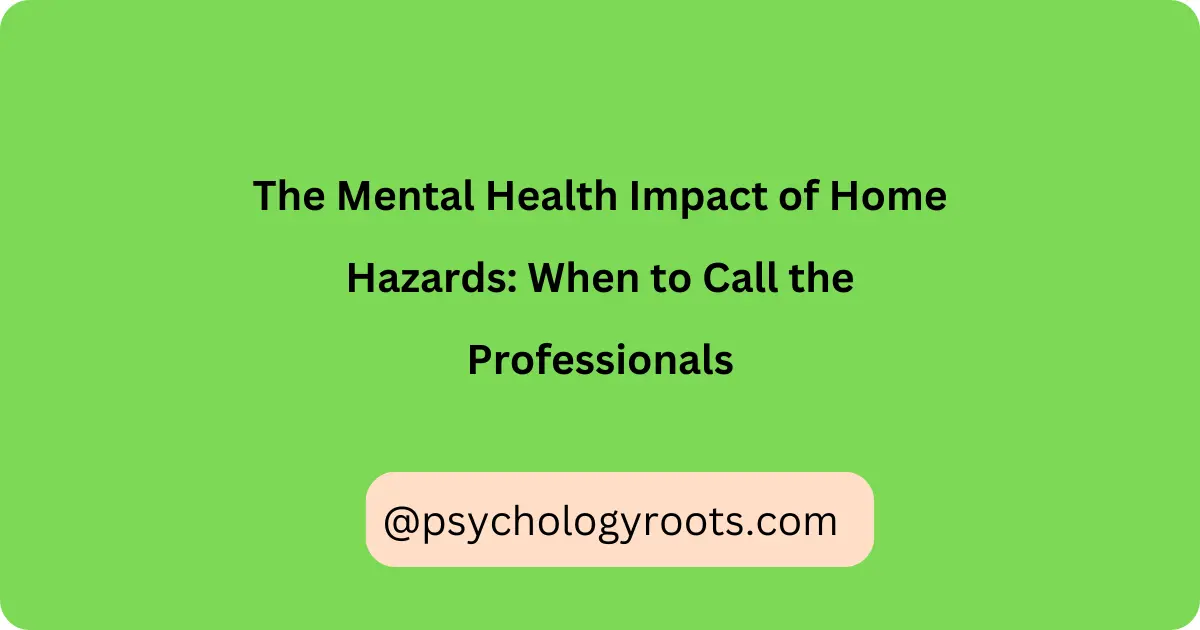Table of Contents
The Mental Health Impact of Home Hazards: When to Call the Professionals
Your home should be a place of safety, relaxation, and psychological comfort. But when environmental hazards creep in—like mold, biohazards, or post-disaster damage—they can affect not just your physical surroundings but also your mental well-being. In some situations, trying to manage the cleanup on your own can increase emotional stress and lead to greater psychological consequences.
Here are five situations where calling professionals isn’t just a smart choice for your home—it’s the right decision for your mental health.
Mold Infestations: Hidden Threats to Mood and Mind
Mold doesn’t just damage walls or cause allergy symptoms—it can significantly affect your emotional health. Prolonged exposure to mold has been associated with mood disturbances, brain fog, and even increased anxiety or depressive symptoms.
When should you call the professionals?
If mold is visible on walls, spreading rapidly, or causing a musty smell throughout your home, it’s time to act. Attempting to remove it yourself without proper tools can spread spores and worsen both the physical and emotional environment.
👉 Professional mold removal services can help restore your space and peace of mind, ensuring that the air you breathe supports—not sabotages—your mental clarity.

Biohazards: Trauma Beyond the Surface
Cleaning up biohazardous materials like bodily fluids or deceased animals isn’t just a physical health risk—it can also be psychologically traumatic. These situations often involve grief, shock, or exposure to reminders of traumatic events.
Why call experts?
Trained biohazard cleanup professionals know how to manage the situation safely, legally, and with compassion. Outsourcing this responsibility can reduce the risk of triggering PTSD, anxiety, or prolonged stress.
Post-Construction or Renovation Stress
Major home renovations might be exciting—but the aftermath often leaves homeowners in what psychologists call decision fatigue and sensory overload. Dust, clutter, and unfinished spaces can trigger irritability, poor concentration, or anxiety—especially for individuals already coping with stress.
How pros help:
Professional cleaners can remove every trace of post-renovation chaos, allowing your brain to relax and fully transition into a sense of home again.
Deep Carpet & Upholstery Cleaning: Clearing the Cluttered Mind
Dirty carpets and furniture aren’t just unsightly—they can harbor allergens, bacteria, and odors that subtly affect your mood and energy. A cluttered or unclean space is often linked to lower psychological resilience and can worsen feelings of being overwhelmed.
Solution:
Professional-grade cleaning can create a refreshed, healthier space, giving your mind permission to focus, relax, and recover.
After a Fire or Flood: Restoring Psychological Safety
Experiencing a fire or flood is not just a physical emergency—it’s a psychological trauma. The sense of loss, displacement, and exposure to destruction can lead to symptoms of acute stress disorder or even PTSD.
Why hire professional restoration services?
They handle the complex cleanup, allowing families to focus on emotional recovery, reconnect with support systems, and re-establish a sense of normalcy.
Final Thoughts: Your Environment Shapes Your Mental Health
Mental health isn’t just shaped by what we think or feel—it’s also influenced by where we live. Our physical surroundings can either support our recovery or amplify our stress. Recognizing when a situation is beyond your capacity to manage and calling in professionals is a form of self-care and psychological preservation.
Don’t hesitate to seek help. Whether it’s mold in the walls or chaos in the aftermath of a disaster, restoring a clean, safe, and stable environment is an essential step toward mental wellness.
Help Us Improve This Article
Have you discovered an inaccuracy? We put out great effort to give accurate and scientifically trustworthy information to our readers. Please notify us if you discover any typographical or grammatical errors.
Make a comment. We acknowledge and appreciate your efforts.
Share With Us
If you have any scale or any material related to psychology kindly share it with us at psychologyroots@gmail.com. We help others on behalf of you.